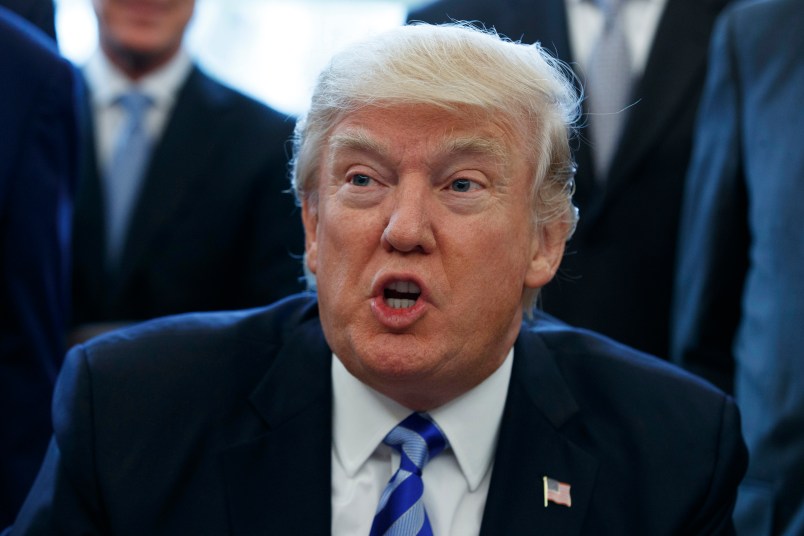Before President Trump had even signed an executive order creating his long awaited “Elections Integrity” Commission, prominent civil rights groups and voting advocates were calling it a “sham,” a “distraction” and “a thinly veiled voter suppression task force.”
For them, the tells were the Republicans he had picked to lead it, the coded language in the order itself, and the President’s own unsubstantiated and reckless claims that “millions” had voted illegally in the 2016 election.
“This kind of orientation and resource devotion and the composition that they’ve advertised thus far don’t give me a lot of confidence that this is going to be done in a way that’s reflective of the issues that are happening,” Myrna Perez, deputy director of the Democracy Program at the Brennan Center, told TPM, going on to call the effort a “a sham commission being used to distract from important matters of the day.”
Even election administration experts who had served on presidential election commissions in the past were dubious of Trump’s panel’s true aims.
“It so beyond the pale. What can you say at this point?” said Nate Persily, who served as a senior research director for President Obama’s Presidential Commission on Election Administration. “There are a lot of serious academics who have done a lot of work in this area. Let’s see if any of them staff the commission.”
The promise of a voter fraud investigation has been floated by the Trump administration for months, and finally, on Thursday the White House was ready to roll it out. It’s chair and vice chair—Vice President Mike Pence and Kansas Secretary of State Kris Kobach—were leaked to the press, and by Thursday afternoon, with no press present, Trump had signed the order.
Since Trump began baselessly speculating that voter fraud was rampant, voting rights advocates feared that his comments would be used as cover to pass restrictive voter laws like voter ID that make it harder for minorities and low-income to vote.
With the announcement of a coming executive order, the NAACP-LDF called the commission “a thinly veiled voter suppression task force” that was “designed to impugn the integrity of African American and Latino participation in the political process.”
Many of the Republicans being floated as possible members of the commission have a long history of suggesting that voter fraud is rampant, even as study after study has shown it to be extremely rare.
Kobach is perhaps chief among them. As secretary of state, he lobbied to get prosecutorial powers to go after fraud claims, which so far has resulted in very few prosecutions. He has been pushing a proof-of-citizenship voter registration requirement that’s been tied up in a years-long, multi-lawsuit legal battle. As part of his efforts to implement the requirement, he had to provide justification that non-citizen voter registration was a problem. For the Wichita-area Sedgwick County, his office could only point to 18 instances since 2003 of a non-citizen registering or attempting to register; often it was accidental and only once did the person actually vote, according to the court doc.
“Kobach has always been the chicken little of voter fraud,” said J. Gerald Hebert, a former Justice Department official who now leads the Voting Rights and Redistricting Program at the Campaign Legal Center.
“That leads me to believe that this will not be a very scholarly or fact-based commission,” Hebert said. “It’s going to be one that already knows what its views are and is going to go out and find examples.”
The names of two Democrats—the secretaries of state in Maine and New Hampshire— have been floated as well. ABC News reported that a White House official said they were seeking to make it bipartisan and thus were including voter suppression among the topics the committees is investigating.
Matt Dunlap, Maine’s Democratic secretary of state, told TPM he would be “the first to speak up” if the panel was used as a “trojan horse” to restrict access to the ballot box.
It’s worth noting that “voter suppression” is mentioned no where in the executive order text. It instead defines terms like “improper voting” and “improper voter registration” that happen “regardless of the state of mind or intent of that individual.”
The registration reference was of particular concern to advocates, who worry that discrepancies on the voter rolls—such as the names of dead people or non-citizens—will be used to justify erecting more obstacles to the ballot box.
“You’re going to have mistakes,” Perez said. “A mistake on a roll and the rolls being messy is not the same thing as some trying to steal an election or the wrong candidate winning or the system being undermined.”
Trump, without evidence, ramped up the possibility of voter fraud before the election, and even after he won alleged—again, without any evidence—that 3 to 5 million people voted illegally.
“He might be interested in a commission that will validate his unsubstantiated ideas” or otherwise undermine the public confidence in elections, said Rick Hasen, a UC-Irvine law professor who runs the Election Law Blog.
“I think they’re going to recommend national legislation,” said Persily, who is now an election law professor at Stanford Law. “Why do this unless that’s what you’re going to do.”
“It should be no surprise that the election commission will not be looking at how proposed remedies will lead to eligible people not being able to cast ballots,” Persily added. “That is certainly a bigger problem than ineligible people casting ballots”










